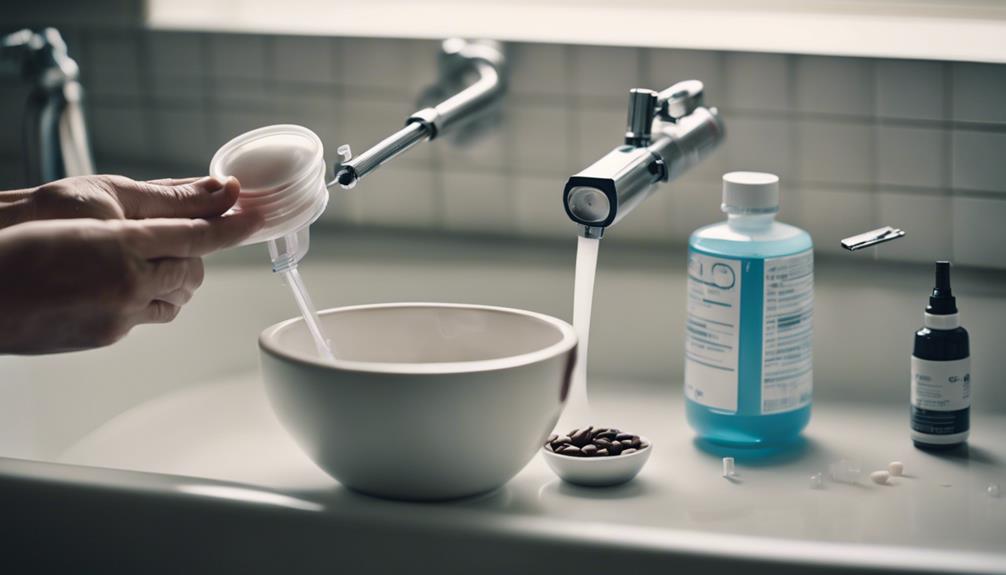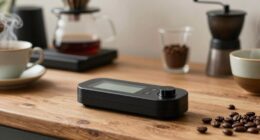Coffee is generally free of sulfites, with the exception of certain types like instant coffees and flavored drinks that may contain small traces. Typically, regular brewed coffee such as black coffee or espresso is considered to be sulfite-free. To ensure you are making an informed decision, always check the packaging of your coffee for any indications of sulfite content. Keep in mind that specialty roasters and small-batch coffee beans are usually free of sulfites if you are concerned about them. If you would like to learn more about the sulfite content in various coffee products, further research can help you make educated choices.
Key Takeaways
- Most coffee is sulfite-free, especially brewed black coffee.
- Instant coffees or flavored varieties may contain trace amounts.
- Check coffee packaging for sulfite warnings.
- Specialty roasters offer sulfite-free options.
- Brewing pure coffee at home minimizes sulfite intake.
What Are Sulfites Exactly?
As you explore the world of food additives, you may have wondered what sulfites are, so let's start with the basics: sulfites are sulfur-based substances commonly used as preservatives in food products. These substances play an important role in preventing oxidation, improving texture, and inhibiting microbial growth in various food items.
You might be familiar with some examples of sulfites, such as sodium sulfite, sodium bisulfite, and potassium metabisulfite. One prevalent sulfite used in food preservation processes is sulphur dioxide.
Sulfites are added to foods like bread, pizza dough, and shellfish to extend their shelf life. By understanding what sulfites are and their purpose, you'll be better equipped to make informed decisions about the food you consume.
Sulfites aren't a mystery, and knowing the basics will help you navigate food labels with confidence. Now that you know what sulfites are, you can move forward with a clearer understanding of their role in the food industry.
Sulfite Allergy and Intolerance

Your body's sensitivity to sulfites can manifest in a range of ways, from mild allergic reactions to severe, life-threatening conditions. If you're one of the approximately 1% of people with sulfite sensitivity, it's important to be aware of the potential risks.
| Symptoms | Description |
|---|---|
| Mild Reactions | Hives, itchiness, flushing |
| Respiratory Issues | Asthma exacerbation, shortness of breath |
| Severe Conditions | Anaphylactic shock, swallowing difficulties |
As someone with sulfite sensitivity, you may experience respiratory issues like asthma exacerbation when exposed to sulfites. Foods like baked goods, dried fruit, and wine commonly contain sulfites, in addition to certain medications and cosmetics. To manage your sulfite allergy, it's vital to read labels carefully and avoid foods and products that may contain sulfites. By being proactive and informed, you can minimize the risks associated with sulfite sensitivity. Remember, sulfite sensitivity is a serious condition that requires attention and caution.
Coffee and Sulfite Content

Coffee lovers with sulfite sensitivity can breathe a sigh of relief, as their daily cup of joe is nearly or completely sulfite-free. You can enjoy your morning coffee without worrying about sulfite content.
However, it's important to note that some types of coffee may contain trace amounts of sulfites. For instance, some instant coffees may have minimal levels of sulfites, but the amounts are generally insignificant. Additionally, certain coffee machine cups or pods, such as Keurig coffee pods, may contain very small amounts of sulfites.
It's always a good idea to check the label on your coffee packaging for any warning about sulfite inclusion. While sulfites in coffee are typically minimal, it's crucial to be aware of their potential presence in specific forms like instant coffee or coffee pods. By being informed, you can make an informed decision about your coffee choices.
Types of Coffee With Sulfites

You might be surprised to learn that certain types of coffee, such as instant coffees and some coffee pods, can contain trace amounts of sulfites. Coffee pods, in particular, may contain sulfites, so it's important to check the packaging for any warnings about sulfite content.
Flavored coffees or specialty coffee drinks may also have added ingredients that contain sulfites. However, regular brewed coffee, like black coffee or espresso, is typically sulfite-free.
To determine if your coffee contains sulfites, it's vital to understand the specific coffee product and its ingredients. Not all types of coffee contain sulfites, and it's crucial to be aware of what you're consuming. Be sure to read labels carefully and look for certifications or warnings about sulfite content.
Sulfite-Free Coffee Alternatives

By opting for specialty coffee roasters or small-batch coffee beans, you can easily find sulfite-free coffee alternatives that cater to your taste preferences. Since coffee is naturally low in sulfites, you can explore various options without worrying about sulfite sensitivities.
Here's a comparison of popular coffee options:
| Coffee Type | Sulfite Level | Recommendation |
|---|---|---|
| Specialty Roasters | Very Low | Recommended for sulfite-free alternatives |
| Small-Batch Coffee Beans | Very Low | Excellent option for sulfite-free coffee |
| Instant Coffee | Minimal | Safe choice, but check packaging for warnings |
| Coffee Pods (e.g., Keurig) | Minimal | Check packaging for warnings, but generally safe |
| Regular Coffee Beans | Very Low | A good option, but may vary depending on roasting process |
As you can see, most coffee options are naturally sulfite-free or contain minimal amounts. By choosing specialty roasters or small-batch coffee beans, you can enjoy a sulfite-free coffee that suits your taste buds.
Other Foods High in Sulfites

As you explore foods high in sulfites, you'll find that wine and beer are two common culprits. In fact, these beverages often contain higher levels of sulfites than coffee.
You'll also discover that dried fruit products, which may seem like a healthy snack, can also harbor significant amounts of sulfites.
Wine and Beer
Wine and beer, two popular beverages, contain high levels of sulfites, which are added during the fermentation and bottling process to act as a preservative. As you probably know, sulfites are commonly used in wine and beer production to prevent spoilage and oxidation. However, you mightn't be aware that sulfites in these beverages can trigger reactions in sulfite-sensitive individuals.
If you're one of them, you might experience headaches or allergic reactions after consuming wine or beer due to sulfite content.
It's essential to read labels on wine and beer bottles to identify sulfite levels, especially if you have sensitivities. You can take control by being mindful of the sulfite content in your drinks. Remember, sulfites are intentionally added to these beverages to extend their shelf life.
Dried Fruit Products
When you reach for dried fruit products like apricots, raisins, and prunes, you're likely consuming high levels of sulfites, which are intentionally added to preserve their color and freshness.
These dried fruit products are high in sulfites, which can be a concern for individuals with sulfite sensitivities. Sulfites in dried fruits can trigger allergic reactions in sensitive individuals, making it essential to exercise caution when consuming them.
If you're sensitive to sulfites, it's important to read labels carefully and choose sulfite-free dried fruit options. This is especially vital for those who experience adverse reactions to sulfites.
Sulfite Sensitivity Symptoms

If you're sensitive to sulfites, you may experience a range of symptoms, from mild discomfort to life-threatening reactions. Sulfite allergies can trigger a variety of responses in your body, and it's important to recognize the signs to take appropriate action.
You may break out in hives or experience flushing, which can be uncomfortable and unsightly. In severe cases, sulfite allergies can lead to trouble swallowing, which can be distressing and even dangerous.
For individuals with asthma, sulfite allergies can exacerbate symptoms, making it even harder to breathe. In extreme cases, severe reactions to sulfites can lead to anaphylactic shock, a life-threatening condition that requires immediate medical attention.
The severity of sulfite allergy symptoms varies among individuals, and it's crucial to be aware of your body's response to sulfites. If you suspect you have a sulfite allergy, it's important to consult a healthcare professional for proper diagnosis and treatment. Don't underestimate the potential risks of sulfite sensitivity – it can be life-threatening, especially when combined with asthma.
Managing Sulfite Intolerance

To minimize your sulfite intake, you should take a thorough approach to managing sulfite intolerance, starting with a careful examination of coffee product labels. Look for sulfite additives, which can exacerbate intolerance symptoms. Opting for whole coffee beans or unflavored coffee is a safer bet, as these products are less likely to contain sulfites.
Brewing coffee at home using pure ingredients can also help you avoid sulfites commonly found in pre-packaged options. It's essential to consult with healthcare professionals to determine the best approach for managing sulfite intolerance related to coffee consumption. Keeping a food diary can also help you track any adverse reactions to coffee or other sulfite-containing foods, allowing you to better manage your intolerance.
Safe Coffee Options for All

You can breathe easy knowing that most coffee products are sulfite-free, making them a safe choice for the majority of coffee lovers. This is because sulfites are typically not added to coffee during the roasting or brewing process.
However, it's crucial to note that some coffee products may contain sulfites, albeit in minimal amounts. Instant coffees and certain coffee pods are examples of products that may contain sulfites. To make sure your coffee is sulfite-free, always check the packaging for any warnings or indications of sulfite content.
If you're particularly sensitive to sulfites, it's best to opt for plain, unflavored coffee to minimize potential exposure. Remember, the majority of coffee products don't contain sulfites, making them a safe choice for most individuals.
Frequently Asked Questions
Does Coffee Have Sulfites in It?
You're wondering if coffee has sulfites in it? Generally, the answer is no. Coffee is nearly sulfite-free, making it a safe choice for most people.
In fact, the natural compounds in coffee, such as antioxidants and polyphenols, can actually offer some health benefits. However, one potential downside is that coffee can stain teeth over time. So while it may not contain sulfites, it’s important to be mindful of the potential for tooth discoloration. Does coffee stain teeth? It’s a good idea to rinse your mouth with water or brush your teeth after drinking coffee to help minimize any staining effects.
However, some instant coffees or coffee pods might contain tiny amounts of sulfites, but these levels are usually insignificant. If you have a sulfite allergy, it's still important to check packaging labels to guarantee your safety.
What Drinks Are High in Sulfites?
You might be surprised to learn that about 1 in 100 people are sensitive to sulfites.
When it comes to drinks high in sulfites, you should be cautious of store-bought fruit juices, sodas, and some bottled waters. These beverages often contain sulfites as preservatives, which can be harmful to sensitive individuals.
Specifically, juices may contain high fructose corn syrup and sodas may have caramel color, both of which can contain sulfites.
Do Eggs Have Sulfites in Them?
You're wondering if eggs contain sulfites. Rest assured, they don't. Eggs are a whole food without additives, and sulfites aren't used in their production or preservation.
As a result, eggs are a sulfite-free protein option for individuals with sensitivities or allergies. You can consume eggs without worrying about sulfite exposure.
This means you can enjoy eggs without concern, making them a great option for those with sulfite allergies or sensitivities.
What Drinks Do Not Contain Sulfites?
You're wondering what drinks don't contain sulfites? Well, you'll be relieved to know that most beverages are sulfite-free.
Plain water, 100% fruit juices, and most teas are all sulfite-free.
Additionally, many popular soft drinks, like cola and lemon-lime soda, don't contain sulfites.
When in doubt, always verify the label or consult with the manufacturer to make sure the drink meets your sulfite-free standards.
Conclusion
To sum up, coffee doesn't naturally contain sulfites. While some flavored or processed coffees may have added sulfites, choosing plain, organic coffee can help avoid this potential allergen.
Be sure to check labels and opt for sulfite-free options if you have a sensitivity. By making informed choices, you can enjoy your daily cup of coffee without worry about sulfite content.









